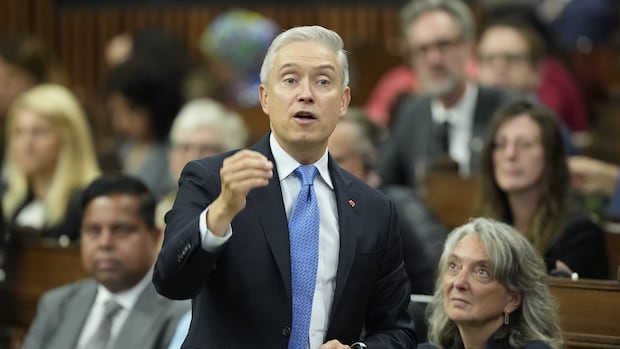The Liberal government will table the federal budget — the first under Prime Minister Mark Carney — in early November.
During Tuesday’s question period, Finance Minister François-Philippe Champagne said the federal finances will be introduced on Nov. 4.
The early November date is later than the government had initially indicated. Carney said as early as May that the budget would come in October, and a number of ministers had stuck to that date when talking about the budget in recent days.
Just Monday morning, government House leader Steven MacKinnon indicated the budget would be brought forward next month during a news conference laying out the Liberals’ fall agenda.
During Tuesday’s question period, Finance Minister François-Philippe Champagne said the federal budget will be introduced on Nov. 4. This will be the first budget introduced under Prime Minister Mark Carney.
“The Minister of Finance, Mr. Champagne, will present a budget in October. I will not go into the details of what to expect. The prime minister and the minister of finance have both emphasized the importance of this budget,” MacKinnon said.
Federal budgets are usually tabled in the early spring, but the Liberals pushed it to the fall because the House only sat for a few weeks in the spring following April’s election.
The Liberals have been signalling they intend to find savings in the federal finances.
Carney and Champagne have asked ministers and departments to find “ambitious savings” and cut regulations. Champagne also asked the public service to review all current and planned federal contracts in an effort to find savings.
The Liberals have signalled they intend to cut government operational spending by 7.5 per cent for the 2026-27 fiscal year, 10 per cent the following year and 15 per cent in 2028-29.
On the first day of a new sitting of Parliament, Prime Minister Mark Carney faced questions about how the fall budget will cover the cost of recent government spending, which has created a ‘substantial’ deficit.
Despite that, the prime minister said Sunday that the deficit “will be bigger than it was last year.”
The last time the public had eyes on the federal finances, the deficit was pegged at $61.9 billion.
Carney pointed to a number of factors when explaining the deficit size, including the U.S. tariffs and subsequent federal supports for impacted industries, the government’s commitments to boost NATO spending and the federal income tax cut.
“So, yes, there’s going to be implications for the deficit. But it will build a much stronger Canada,” Carney told reporters Sunday.

